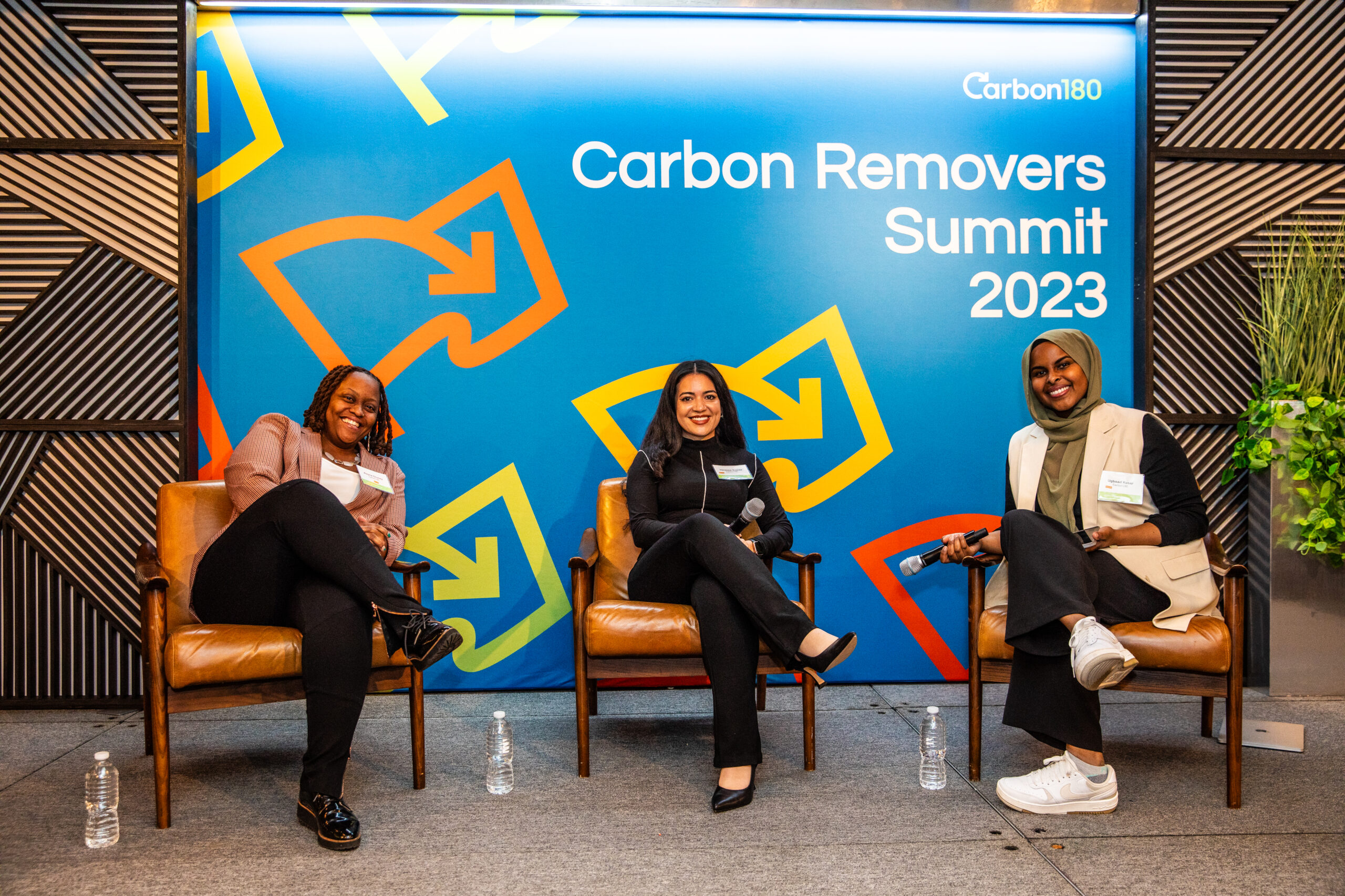Curated conversation and connection for every carbon remover.

The Carbon Removers Summit is back for its third year of bringing together those shaping carbon removal, today and tomorrow. This year’s event will feature curated conversations on topics like carbon removal law, powering DAC with renewables, agroforestry at the local level, and more.
Please note our summit is invite only and registration is non-transferable.
Register Today
Summit Agenda
Day One: October 28th
Time | Session | Speakers | Room |
|---|---|---|---|
11:00 AM | Registration begins | ||
11:30 AM | Lunch | The Promenade | |
12:30 PM | Opening remarks | Erin Burns Executive Director at Carbon180 | Washington Ballroom |
12:45 PM | Opening keynote | José G. González Founder, Latino Outdoors | Washington Ballroom |
1:00 PM | Break | ||
1:15 PM | Building community-first climate projects So much of carbon removal feels abstract, either because it’s unseen or hard to define. But when it comes to things like benefits, equity, and justice, we can’t afford to act from ambiguity. In this fireside chat, two seasoned advocates discuss what it really means to build community-first projects, drawing from their wealth of experience in community engagement, data transparency, and grassroots policy. Recommended pre-read: Recommendations for meaningful community engagement (Aspen Institute, Center for Rural Enterprise and Environmental Justice) | LaTricea Adams Founder, CEO, and President at Young, Gifted & Green Darren Riley Co-founder and CEO at JustAir Gautama Mehta (Moderator) Environmental Justice Reporting Fellow at Grist | Washington Ballroom |
2:30 PM | Break | ||
2:45 PM | Meditations on community power and developer objectives Today, communities are asked to engage with carbon removal efforts at a speed that often outpaces critical education and capacity building, leading to projects that don’t fully include residents in decision-making. During this workshop, participants will generate a list of best practices to support communities near proposed carbon removal projects, consider what consensual development looks like, and outline adaptable pathways and opportunities for community power. Recommended pre-read: The spectrum of community engagement to ownership (Facilitating Power) | Eric Sutton Senior Managing Environmental Justice Advisor at Carbon180 | Washington Ballroom |
4:30 PM | Closing remarks | Mo Dailey Managing Director of Programs at Carbon180 | Washington Ballroom |
4:45-6:45 PM | Happy Hour | The Promenade |
Day Two: October 29th
Time | Session | Speakers | Room |
|---|---|---|---|
8:30 AM | Breakfast | Scott + Washington Foyer | |
9:30 AM | Opening remarks | Treshia Barclift Managing Director of Strategy and Operations at Carbon180 | Washington Ballroom |
9:45 AM | Welcome keynote | Kai Bosworth, PhD Assistant Professor of International Studies, Virginia Commonwealth University | Washington Ballroom |
10:00 AM | Break | ||
10:15 AM | Learning from land CDR practitioners Many effective land-based carbon removal practices are rooted in Traditional Ecological Knowledge and BIPOC ingenuity. However, current advocacy and mainstream media lack representation from these voices. This discussion with Carbon180’s environmental justice grantees and BIPOC agroforestry steering committee members will explore land-based carbon removal approaches that uplift BIPOC leadership and align with community needs. Recommended pre-read: Regranting for just carbon removal (Carbon180), Steering Committee of BIPOC leaders (Carbon180) | Sara Medina Sustainable Agriculture and Land Manager at Restore the Delta Liz Holloway Carbon Removal Project Manager at Appalachian Voices Lord Ameyaw, PhD Assistant Professor at University of Nebraska–Lincoln Igalious Mills Owner, Mills Consulting Maya Glicksman (Moderator) Senior Policy Advisor at Carbon180 | Dupont |
10:15 AM | How we fund DAC Who is funding DAC while innovators try to perfect their technology and drive down costs? In this session, a developer, funder, and policy expert follow the money, zooming in on DAC’s current investment landscape, the forecast for future diversification, and strategies to close the investment gap. Recommended pre-read: The Procurement Toolbox (Carbon180) | Keeton Ross Co-founder at Holocene John Milko Senior Managing Policy Advisor at Carbon180 Poppy Russell Research Associate at Counteract Amrith Ramkumar (Moderator) Climate Finance Reporter at the Wall Street Journal | Thomas |
11:30 AM | Break | ||
11:45 AM | Stewarding land and community resiliency Current incentives for land-based carbon removal focus solely on carbon outcomes, but soil carbon has several important co-benefits for the climate and communities. This session will convene experts to explore supporting land stewards to leverage natural carbon sinks. Panelists will discuss holistic land stewardship practices and what reimagined incentives that prioritize biodiversity, soil health, and resilience could look like. Recommended pre-reads: the Environmental Performance Index (Yale), Indigenous-led metrics and mapping to improve human and agricultural system health (Piikani Lodge Health Institute) | Kim Paul Executive Director at the Piikani Lodge Health Institute Tim Crews Chief Scientist at The Land Institute Andrew Berger Director of Agriculture and Climate Adaptation Programs at the Piikani Lodge Health Institute Larisa Jacobson Climate Justice & Advocacy Co-Director at Northeast Farmers of Color Land Trust Cristel Zoebisch Director of Policy at Carbon180 Lisa Held (Moderator) Senior Staff Reporter at Civil Eats | Dupont |
11:45 AM | Powering up equitable energy sources for DAC DAC is an essential climate technology but requires substantial energy resources. Providing the energy to meet DAC’s needs without creating sacrifice zones is a challenge — but it is also an opportunity to envision a future powered by just, equitable, sustainable energy. In this conversation, panelists will discuss what energy needs for DAC will look like and how to pursue environment- and community-centered scaling. Recommended pre-reads: 6 things to know about DAC (WRI), DAC opportunity state-by-state (RHG), DAC should be more than a climate solution (Carbon180) | Andrew Fishbein Lead Government Affairs North America at Climeworks Chris Walker Vice President of Policy and Programs at GRID Alternatives Alex Spike Climate Justice Coordinator at Air Alliance Houston Courtni Holness Managing Policy Advisor at Carbon180 Justin Worland (Moderator) Senior Correspondent at TIME | Thomas |
1:00 PM | Lunch | Washington Ballroom | |
2:30 PM | Carbon removal law and community benefits At its best, carbon removal can bring myriad benefits like new jobs, a cooler planet, and avenues for community ownership. But to move from potential to reality, these benefits need to be codified in our legal systems. This session will explore the function of community benefits agreements, their enforceability, and the state of these agreements in the US today. Recommended pre-reads: Environmental justice and Title VI of the Civil Rights Act: A critical crossroads (Albert Huang) | Hadia Sheerazi Community Engagement Manager at RMI Quinn Antus Emerging Markets and Carbon Management Program Manager at the Colorado Energy Office Julian Gross Attorney, Law office of Julian Gross Alayna Chuney, Esq. (Moderator) Director at Carbon180 | Washington Ballroom |
3:30 PM | Break | ||
3:45 PM | New futures for carbon removal Ambitions for carbon removal today are impressive, but at this early stage, we must continue evolving our perceptions of what’s possible. In this fireside chat, speakers will discuss the future they want for carbon removal and how to get there, pushing each other to think beyond their initial assumptions to imagine something new. Recommended pre-reads: Boosting demand for CDR (BCG), 100 Conversations on Carbon Removal, Decarbonization, and Desired Futures (Holly Jean Buck) | Anu Khan Founder and Executive Director at the Carbon Removal Standards Initiative Erin Burns Executive Director at Carbon180 Peter Minor, PhD CEO and Co-founder at Absolute Climate Josh Siegel (Moderator) Reporter at Politico | Washington Ballroom |
4:45 PM | Closing remarks | Erin Burns Executive Director at Carbon180 | Washington Ballroom |
First time joining us? What is carbon removal, anyway?
Helpful resources + tools
-
Read
-
Listen
- Nori’s “Carbon Removal Newsroom” and “Reversing Climate Change”
-
Watch
- Vox’s “The tricky plan to pull CO2 out of the air”
- The Institute for Carbon Responsible Removal’s webinar series
-
Visualize
- Roads to Removal: Options for Carbon Dioxide Removal, an interactive map
- CDR.fyi’s Carbon Removal Map
- “The Road to 10 Gigatons,” the carbon removal scale up game
- Explore our graphics library

Planning your trip

Coming from out of town? Book your stay at the Westin Georgetown by October 4th to get a guaranteed rate of $379/night.

Curated conversation. Authentic connection. Carbon Removers Summit.

-
Transit + Parking
The Westin Georgetown is a 10-minute walk from the Foggy Bottom-GWU Metro Station, accessible from the orange, blue, and silver lines. For those driving, valet parking is offered by the hotel, and nearby public parking garages are available.
-
COVID-19 Safety Acknowledgment
We take safety seriously. As we approach the Summit, we’re taking into consideration all city guidelines and are monitoring the COVID situation in Washington, DC.
-
Land Acknowledgement
The Westin Georgetown sits on the unceded ancestral homelands of the Nacotchtank (or Anacostans) and the Piscataway peoples. These groups were among the first to make contact with European colonizers, facing disease, displacement, imprisonment, and erasure. You can learn more about the land you inhabit using the Native Land Map.

